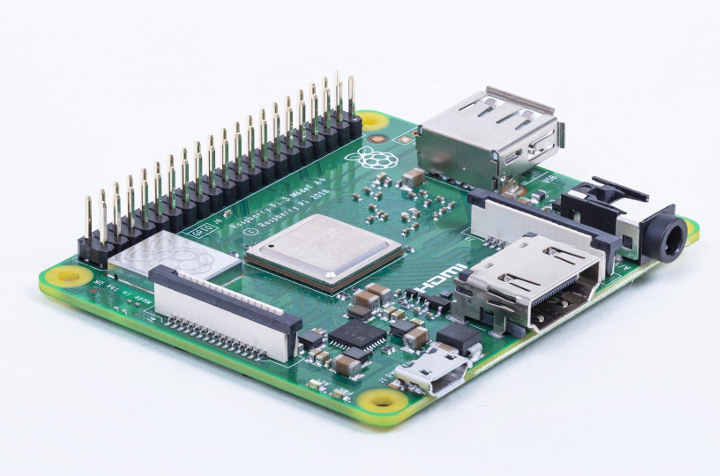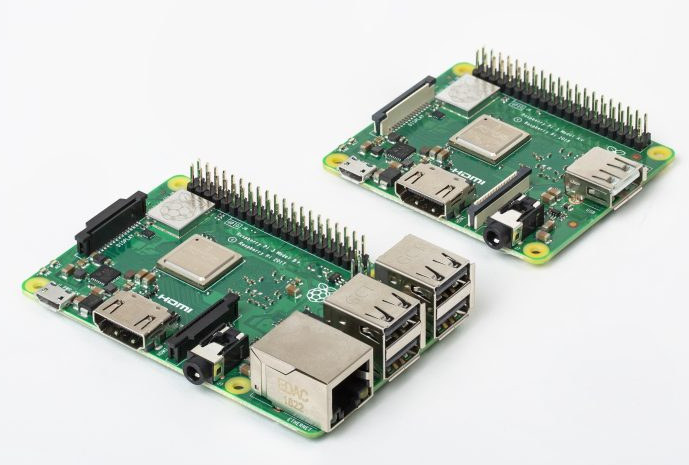The Raspberry Pi 3 B+ is likely the most popular maker board available today at $35, but it just got a little brother – Raspberry Pi 3 Model A+ – that should also enjoy good popularity with a $25 price tag.
The new model features the same BCM2837B0 quad core processor @ 1.4 GHz, and dual band WIFI connectivity, just in a smaller form factor.

Raspberry Pi 3 Model A+ specifications:
- SoC – Broadcom BCM2837B0 64-bit ARMv8 quad core Cortex A53 processor @ 1.4GHz with dual core VideoCore IV GPU
- System Memory – 512MB LPDDR2
- Storage – micro SD slot
- Video & Audio Output – HDMI 1.4 and 4-pole stereo audio and composite video port
- Connectivity – WiFi 802.11 b/g/n/ac and Bluetooth 4.2 LE (via Cypress CYW43455 based module)
- USB – 1x USB 2.0 host port, 1x micro USB port for power
- Expansion
- 40-pin GPIO header
- MIPI DSI for Raspberry Pi touch screen display
- MIPI CSI for Raspberry Pi camera
- Power Supply – 5V up to 2.4A via micro USB port, or 5V DC via GPIO header
- Dimensions – 65 x 56 mm

In order to decrease the price by $10, they obviously had to cut some features. We lost the “Gigabit” Ethernet port, memory dropped to 512 MB RAM instead of 1GB, and there’s only one USB port. There also some invisible changes with improved USB mass-storage booting and improved thermal management.
The Raspberry Pi 3 Model A+ sells for $25 on sites like Canakit, Piromini or ModMyPi, and will remain in production until at least January 2023.


Jean-Luc started CNX Software in 2010 as a part-time endeavor, before quitting his job as a software engineering manager, and starting to write daily news, and reviews full time later in 2011.
Support CNX Software! Donate via cryptocurrencies, become a Patron on Patreon, or purchase goods on Amazon or Aliexpress





Popcorns and waiting the @tkaiser comments !!!
Joining in 😉
It’s funny how people complained about the shared USB bandwidth and now they’ll probably still complain even though this has one USB. Maybe Orange Pi folks don’t get that 99% of people appreciate build quality.
> build quality
The waiting has an end! RPi Trading’s Social Media Influencer is back. You surely know that your company limits all RPi 3B+ world-wide to 1200 MHz under load by adjusting a thermal threshold from 70°C to 60°C to masquerade shitty build quality on 1st production batch that resulted in freezes on a handful of RPi 3B+ on this planet?
You remember how your company failed with your inferior and overheating PoE HAT thingy: https://www.cnx-software.com/2018/09/14/raspberry-pi-poe-hat-power-issues/
Really funny to mention ‘build quality’ here 🙂
Patetic
GBit-Ethernet wasn’t real Gigabit enyway 😀
‘We lost the Gigabit Ethernet port’ — we had a gigabit port?.. ; ]
Well that’s the way the Raspberry Pi foundation promotes it, they would not lie, would they? 🙂 Anyway I’ve changed the text to a more accurate:
Look funny with ROCK64. May be 5 years ago news ?
More garbage from the “foundation” – ( aka Broadcom’s factory outlet )
Id trade wifi for an sdio and more ram… Then all junk gone (except for the VC4)
La Frite is pretty much this without WiFi and with more RAM.
Has anyone told them the $19.99, 1gb , 1 GB Ethernet, A64, NanoPi A64 exists?
$19.99 = £ 15.58p
What a strange little board. Looks like an Orange Pi Zero wannabe–or one of the many other similar sized boards.
Seems the Foundation is relying on Stockholm Syndrome for their sales, still.
Hmm… for use cases where no Ethernet is needed this board looks like an interesting choice given the price, most probably sane idle consumption and certified and somewhat decent wireless due to usable 5GHz band.
The missing LAN7515 (containing two internal USB hubs in cascaded fashion and the crappy GbE adapter) should result in way less idle consumption compared to the RPi 3B+. Only open questions:
* how dies idle consumption looks like?
* is the board also crippled (limited to 1200 MHZ when exceeding 60°C as RPi Trading folks did with 3B+ to masquerade shitty manufacturing in the 1st production batch)?
* Can the USB port turned into OTG to allow for gadget mode?
“this board looks like an interesting choice given the price”
The price?
What exact advantages this board has over other less expensive boards, like the aforementioned NanoPi A64 ??
I get such a RPi 3 A+ for 24€ (maybe a bit less over time — VAT and shipping included) while I need to spend 10 bucks more for a NanoPi A64: https://geizhals.de/friendlyarm-nanopi-a64-a1595946.html (which I don’t want anyway since crappy 2.4GHz Wi-Fi and forgotten battery connector which makes it the least attractive A64 board of all in my opinion)
It seems ALLNET has stopped distributing FriendlyELEC products which is bad news for businesses wanting NanoPi here in my location. And comparing retail prices (RPi) with ‘Chinese shop prices’ (where shipping, VAT and customs need to be considered) is IMO a bit weird.
So you still doing paid work for Xunlong / Orange Pi ?
How much was it now, Stephen paid you?
I cited that NanoPi as a example, putting it another way, for what uses cases this Rpi will better suited than a similar (or less) priced chinese board?
Apart from being able to use some Rpi add-ons that may require software specific to Rpi, or being easy to begin for a newbie, I cannot see any advantages?
> for what uses cases this Rpi will better suited than a similar (or less) priced chinese board?
There exist almost no ‘less priced chinese boards’ unfortunately: https://geizhals.de/?fs=nanopi&in= or https://geizhals.de/?fs=orangepi&in= for example.
And I’ve already written why the RPi 3 A+ looks attractive to me but of course I can repeat it: ‘most probably sane idle consumption and certified and somewhat decent wireless due to usable 5GHz band’.
Cheap Chinese boards all have crappy Wi-Fi (2.4 GHz only, single antenna), good wireless capabilities are only present on much more expensive boards (Khadas started with good Ampak modules and today they can be found on a couple of RK3399 boards). But (missing or fake) certifications is still an issue.
Ok, good wifi is a good reason.
I would call it good with 2×2 MIMO and external antennas (which would significantly raise costs). But at least it should be usable in urban areas where the 2.4Ghz band is too overcrowded to be used any more (in my place I can forget about 2.4GHz wireless in the evening hours and on weekends since several years now).
And real certifications make a real difference at least if you order as a business. As far as I know the RPi stuff is ‘modular compliance certified’ or something like that even allowing to build products with an RPi integrated that do not need an additional wireless certification?
If the USB port can’t go into gadget mode, then it’s a failing of software as the *one* USB port on these SoCs are OTG controllers (not your normal HOST) controller after all.
Yeah, I know that the VideoCore has only one OTG port but me being a hardware noob fails to understand whether a specific ‘ID pin’ or something like this is needed. I had good results with an RPi Zero with g_ether module exceeding Fast Ethernet speeds over the Micro USB wire but never got this to work with the hub equipped larger RPi models.
https://gist.github.com/gbaman/50b6cca61dd1c3f88f41 suggests that it should work on the A+ too. But since I just ordered the last NanoPi M1 Plus available at a local German reseller for a business project the definitive answer to this question can wait (M1 Plus has real GbE, same performance than RPi 3A+, 8 GB eMMC, 22€ shipping/VAT included — nice deal)
> same performance than RPi 3A+
BS, I confused ‘NanoPi M1 Plus’ (Allwinner H3) with ‘NanoPi M1 Plus2‘ (H5). Boards based on H3 are slower than a RPi 3B/B+/A+ but doesn’t matter wrt the use case anyway.
The ID pin on OTG is normally just fed into a 5V tolerant GPIO. The ID pin is used to tell the direction of the OTG connection and whether you need to turn on the power chip supplying 5V out the OTG connector. Some PMIC chips handle this with dedicated hardware but it is not a requirement.
A common mistake on boards like this is to not make the +5 on the OTG connector switchable. Some boards missing that power chip will put out 5V at the same time the peripheral is supplying it and a fight ensues. The power chip is a ten cent part and it is necessary for stable OTG operation. I have also seen boards that include the chip but then don’t wire the enable pin on it to a GPIO so that you can turn it on/off.
Thanks for the explanation. I guess with OTG and USB gadget mode on the A+ powering wouldn’t be an issue since I would have to use a (standards violating) A-to-A cable anyway which cuts the power lines?
When you use an A-A cable you have to manually force it into OTG mode. There is no ID pin to generate the interrupt to tell the CPU to switch. A-A cable has four wires, OTG cable has 5.
This is why you can flash some boards with A-A cable but then they don’t work as a USB device after they boot. The boot firmware forced the port into device mode. After the OS boots the port defaults to host mode, with no ID pin no automatic way to switch it back.
Another fact, when you buy a OTG-OTG cable on end will be marked ‘master’. That end of the cable has the ID pin grounded and will force the device it is plugged into to host mode. The ID pin in the other end is +5 and will force that end to device mode.
Where did you get that price?
> Where did you get that price?
Jacob.de: ‘FriendlyELEC / Friendlyarm NanoPi M1 Plus – QuadCore Allwinner 8GB EMMC H3 3xUSB HDMI 1080p (Friendly_M1Plus) (B-Ware)’ — and it was even less (17,34 € without VAT)
It seems this was the last FriendlyELEC product there and as already said it seems ALLNET stopped distributing NanoPi products in DE which is really bad since companies prefer to order from local resellers getting a ‘real’ invoice and warranty handling and stuff like that.
Would’ve made much sense to put the SoC on the Pi Zero form factor.
Keep in mind that the VC4 is still a boring 40nm SoC. Check the thermal images from RPi 3B+ here: https://medium.com/@ghalfacree/benchmarking-the-raspberry-pi-3-b-plus-44122cf3d806
In 2018 RPi Trading Ltd. learnt what ‘competitors’ like Xunlong / Orange Pi do already since years: Using the PCB’s ground plane for effective heat dissipation. Good luck on small boards with this attempt. 🙂
But maybe next February such a Pi Zero W+ will be presented as the next ‘incremental update’ since which future has the RPi platform when giving up boring but backwards compatible VideoCore IV?
https://medium.com/@ghalfacree/benchmarking-the-raspberry-pi-3-a-a7d4df181244
Forget about the weird benchmarking but at least idle consumption is known now: slightly above 1W which is IMO a bit too much. Anyway, it’s not such a fail as the RPi 3 B+.